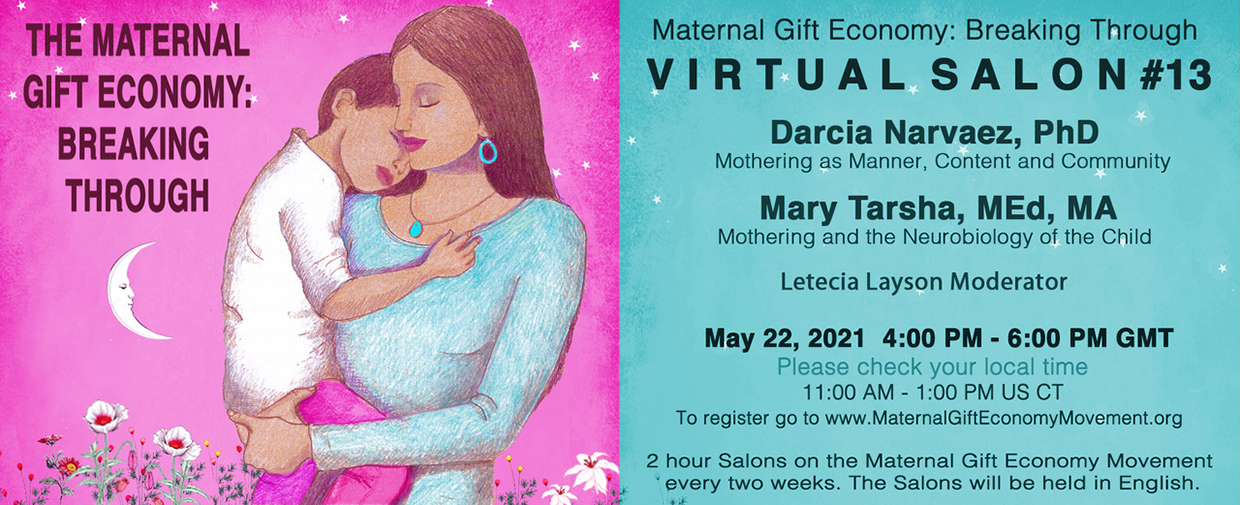
Salon #13 - May 22, 2021
Darcia Narvaez and Mary Tarsha

Darcia Narvaez, PhD
Presentation title: Mothering as Manner, Content and Community
What is mothering? It is a gift of nurturing through manner and content. The manners of mothering include presence, attunement, spontaneous responsiveness to need, and growing relational knowing of the child. Mothering is always backed by the nurturing of mother by the community. The content of our species’ evolved nurturing includes provision by the community of the Evolved Nest: Calm and connected gestation; Soothing birth and immediate post birth; On-request breastfeeding; Welcoming social climate: Affectionate touch; Self-directed social play; Multiple alloparents; Responsive relationships; Nature immersion and connection; Healing practices. The mother is the first giver to a child and her gifts are stronger or more abundant under conditions of a gift community around her. But the child is also raised by the gifts of mothering offered from the community.
Darcia Narvaez - Professor Emerita of Psychology, University of Notre Dame, researches moral development and human flourishing from an interdisciplinary perspective, integrating anthropology, neuroscience, clinical, developmental and educational sciences. She grew up living around the world as a bilingual/bicultural Puerto Rican but calls the earth her home. Dr. Narvaez’s current research explores how early life experience influences wellbeing and moral character in children and adults. She has numerous publications, including more than 20 books such as Indigenous Sustainable Wisdom: First Nation Know-how for Global Flourishing; Basic Needs, Wellbeing and Morality: Fulfilling Human Potential and Embodied Morality: Protectionism, Engagement and Imagination. A recent book, Neurobiology and the Development of Human Morality: Evolution, Culture and Wisdom won national and international awards. She is president of KindredWorld.org, blogs for Psychology Today (“Moral Landscapes”) and hosts the webpage EvolvedNest.org. Also see BreakingTheCycleFilm.org.
Download Darcia Narvaez's presentation
Mary Tarsha, MEd, MA
Presentation title: Mothering and the Neurobiology of the Child
Mary S. Tarsha As Gen Vaughan says, the child’s body “is the result of mothering and being mothered” (Vaughan 2015, p. 38). I discuss research on the effects of mothering manner (e.g., presence; attunement/responsiveness) and content (evolved nest) on young children’s neurobiology. Advances in developmental psychobiological research demonstrate that dynamic interactions between the child and the caregiving environment (mothering and the Evolved Nest) shape children’s biological processes. For example, the autonomic nervous system and the vagus nerve are critical neurobiological components of self-regulation, attention, emotion, communication, relational attachment and social behavior. The oxytocinergic system is also a critical component in developing and maintaining social bonds and may impact stress-coping and global health. Together, these systems serve as neurobiological building blocks of social and moral behavior.
Also discussed jointly by Narvaez and Tarsha are the effects of mothering on sociality and morality. Well-mothered individuals tend to be relationally flexible and attuned, using their gifts to enhance the wellbeing of the community. They form a neurobiology of peaceableness. Undermothered individuals tend to be more relationally self-protective (oppositional and/or withdrawn), less empathic and less socially flexible. In adulthood, they can become vicious (controlling or hurtful toward others) or relationally, emotionally and morally detached.
Mary S. Tarsha is a doctoral student in the Kroc International Institute for Peace Studies and the Department of Psychology at University of Notre Dame. She investigates the neurobiology of moral development, including peaceableness, cooperation, and prosocial/antisocial morality with a particular focus on how early life facilitates (or not) the biosocial construction of wellbeing and sociomorality, specifically the mechanisms of action by which the Evolved Developmental Niche (or Evolved Nest) promotes human flourishing and peaceable children, families and societies. Her work has been published in the International Journal of Partnership Studies, Peace Studies Review, Frontiers in Psychology, Development Psychobiology, Family Relations and numerous books. She is on the board of Kindred World and a contributor to EvolvedNest.org.
Download Mary Tarsha's presentation